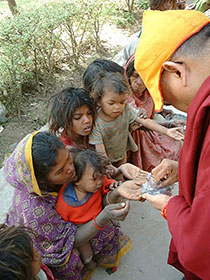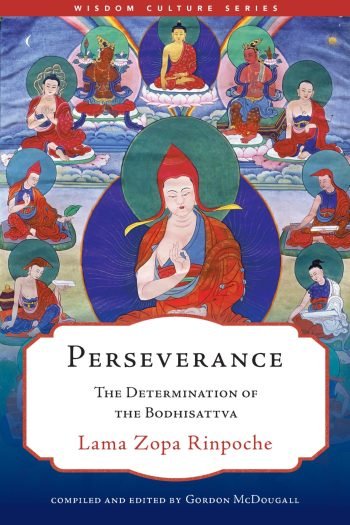- Home
- FPMT Homepage
Foundation for the Preservation of the Mahayana Tradition
The FPMT is an organization devoted to preserving and spreading Mahayana Buddhism worldwide by creating opportunities to listen, reflect, meditate, practice and actualize the unmistaken teachings of the Buddha and based on that experience spreading the Dharma to sentient beings. We provide integrated education through which people’s minds and hearts can be transformed into their highest potential for the benefit of others, inspired by an attitude of universal responsibility and service. We are committed to creating harmonious environments and helping all beings develop their full potential of infinite wisdom and compassion. Our organization is based on the Buddhist tradition of Lama Tsongkhapa of Tibet as taught to us by our founders Lama Thubten Yeshe and Lama Thubten Zopa Rinpoche.
- Willkommen
Die Stiftung zur Erhaltung der Mahayana Tradition (FPMT) ist eine Organisation, die sich weltweit für die Erhaltung und Verbreitung des Mahayana-Buddhismus einsetzt, indem sie Möglichkeiten schafft, den makellosen Lehren des Buddha zuzuhören, über sie zur reflektieren und zu meditieren und auf der Grundlage dieser Erfahrung das Dharma unter den Lebewesen zu verbreiten.
Wir bieten integrierte Schulungswege an, durch denen der Geist und das Herz der Menschen in ihr höchstes Potential verwandelt werden zum Wohl der anderen – inspiriert durch eine Haltung der universellen Verantwortung und dem Wunsch zu dienen. Wir haben uns verpflichtet, harmonische Umgebungen zu schaffen und allen Wesen zu helfen, ihr volles Potenzial unendlicher Weisheit und grenzenlosen Mitgefühls zu verwirklichen.
Unsere Organisation basiert auf der buddhistischen Tradition von Lama Tsongkhapa von Tibet, so wie sie uns von unseren Gründern Lama Thubten Yeshe und Lama Thubten Zopa Rinpoche gelehrt wird.
- Bienvenidos
La Fundación para la preservación de la tradición Mahayana (FPMT) es una organización que se dedica a preservar y difundir el budismo Mahayana en todo el mundo, creando oportunidades para escuchar, reflexionar, meditar, practicar y actualizar las enseñanzas inconfundibles de Buda y en base a esa experiencia difundir el Dharma a los seres.
Proporcionamos una educación integrada a través de la cual las mentes y los corazones de las personas se pueden transformar en su mayor potencial para el beneficio de los demás, inspirados por una actitud de responsabilidad y servicio universales. Estamos comprometidos a crear ambientes armoniosos y ayudar a todos los seres a desarrollar todo su potencial de infinita sabiduría y compasión.
Nuestra organización se basa en la tradición budista de Lama Tsongkhapa del Tíbet como nos lo enseñaron nuestros fundadores Lama Thubten Yeshe y Lama Zopa Rinpoche.
A continuación puede ver una lista de los centros y sus páginas web en su lengua preferida.
- Bienvenue
L’organisation de la FPMT a pour vocation la préservation et la diffusion du bouddhisme du mahayana dans le monde entier. Elle offre l’opportunité d’écouter, de réfléchir, de méditer, de pratiquer et de réaliser les enseignements excellents du Bouddha, pour ensuite transmettre le Dharma à tous les êtres. Nous proposons une formation intégrée grâce à laquelle le cœur et l’esprit de chacun peuvent accomplir leur potentiel le plus élevé pour le bien d’autrui, inspirés par le sens du service et une responsabilité universelle. Nous nous engageons à créer un environnement harmonieux et à aider tous les êtres à épanouir leur potentiel illimité de compassion et de sagesse. Notre organisation s’appuie sur la tradition guéloukpa de Lama Tsongkhapa du Tibet, telle qu’elle a été enseignée par nos fondateurs Lama Thoubtèn Yéshé et Lama Zopa Rinpoché.
Visitez le site de notre Editions Mahayana pour les traductions, conseils et nouvelles du Bureau international en français.
Voici une liste de centres et de leurs sites dans votre langue préférée
- Benvenuto
L’FPMT è un organizzazione il cui scopo è preservare e diffondere il Buddhismo Mahayana nel mondo, creando occasioni di ascolto, riflessione, meditazione e pratica dei perfetti insegnamenti del Buddha, al fine di attualizzare e diffondere il Dharma fra tutti gli esseri senzienti.
Offriamo un’educazione integrata, che può trasformare la mente e i cuori delle persone nel loro massimo potenziale, per il beneficio di tutti gli esseri, ispirati da un’attitudine di responsabilità universale e di servizio.
Il nostro obiettivo è quello di creare contesti armoniosi e aiutare tutti gli esseri a sviluppare in modo completo le proprie potenzialità di infinita saggezza e compassione.
La nostra organizzazione si basa sulla tradizione buddhista di Lama Tsongkhapa del Tibet, così come ci è stata insegnata dai nostri fondatori Lama Thubten Yeshe e Lama Zopa Rinpoche.
Di seguito potete trovare un elenco dei centri e dei loro siti nella lingua da voi prescelta.
- 欢迎 / 歡迎
简体中文
“护持大乘法脉基金会”( 英文简称:FPMT。全名:Foundation for the Preservation of the Mahayana Tradition) 是一个致力于护持和弘扬大乘佛法的国际佛教组织。我们提供听闻,思维,禅修,修行和实证佛陀无误教法的机会,以便让一切众生都能够享受佛法的指引和滋润。
我们全力创造和谐融洽的环境, 为人们提供解行并重的完整佛法教育,以便启发内在的环宇悲心及责任心,并开发内心所蕴藏的巨大潜能 — 无限的智慧与悲心 — 以便利益和服务一切有情。
FPMT的创办人是图腾耶喜喇嘛和喇嘛梭巴仁波切。我们所修习的是由两位上师所教导的,西藏喀巴大师的佛法传承。
繁體中文
護持大乘法脈基金會”( 英文簡稱:FPMT。全名:Found
ation for the Preservation of the Mahayana Tradition ) 是一個致力於護持和弘揚大乘佛法的國際佛教組織。我們提供聽聞, 思維,禪修,修行和實證佛陀無誤教法的機會,以便讓一切眾生都能 夠享受佛法的指引和滋潤。 我們全力創造和諧融洽的環境,
為人們提供解行並重的完整佛法教育,以便啟發內在的環宇悲心及責 任心,並開發內心所蘊藏的巨大潛能 — 無限的智慧與悲心 – – 以便利益和服務一切有情。 FPMT的創辦人是圖騰耶喜喇嘛和喇嘛梭巴仁波切。
我們所修習的是由兩位上師所教導的,西藏喀巴大師的佛法傳承。 察看道场信息:
- FPMT Homepage
- News/Media
-
- Study & Practice
-
-
- About FPMT Education Services
- Latest News
- Programs
- New to Buddhism?
- Buddhist Mind Science: Activating Your Potential
- Heart Advice for Death and Dying
- Discovering Buddhism
- Living in the Path
- Exploring Buddhism
- FPMT Basic Program
- FPMT Masters Program
- FPMT In-Depth Meditation Training
- Maitripa College
- Lotsawa Rinchen Zangpo Translator Program
- Universal Education for Compassion & Wisdom
- Online Learning Center
-
- Prayers & Practice Materials
- Overview of Prayers & Practices
- Full Catalogue of Prayers & Practice Materials
- Explore Popular Topics
- Benefiting Animals
- Chenrezig Resources
- Death & Dying Resources
- Lama Chopa (Guru Puja)
- Lama Zopa Rinpoche: Compendium of Precious Instructions
- Lama Zopa Rinpoche: Life Practice Advice
- Lama Zopa Rinpoche Practice Series
- Lamrim Resources
- Mantras
- Prayer Book Updates
- Purification Practices
- Sutras
- Thought Transformation (Lojong)
- Audio Materials
- Dharma Dates - Tibetan Calendar
- Translation Services
- Publishing Services
- Ways to Offer Support
- Prayers & Practice Materials
-
- Teachings and Advice
- Find Teachings and Advice
- Lama Zopa Rinpoche Advice Page
- Lama Zopa Rinpoche: Compendium of Precious Instructions
- Lama Zopa Rinpoche Video Teachings
- ༧སྐྱབས་རྗེ་བཟོད་པ་རིན་པོ་ཆེ་མཆོག་ནས་སྩལ་བའི་བཀའ་སློབ་བརྙན་འཕྲིན།
- Podcasts
- Lama Yeshe Wisdom Archive
- Buddhism FAQ
- Dharma for Young People
- Resources on Holy Objects
- Teachings and Advice
-
-
*If a menu item has a submenu clicking once will expand the menu clicking twice will open the page.
-
-
- Centers
-
- Teachers
-
- Projects
-
-
-
-
*If a menu item has a submenu clicking once will expand the menu clicking twice will open the page.
-
-
- FPMT
-
-
-
-
-
I want to say without hesitation that the purpose of our life is happiness.
His Holiness the Dalai Lama
-
-
-
- Shop
-
-
-
The Foundation Store is FPMT’s online shop and features a vast selection of Buddhist study and practice materials written or recommended by our lineage gurus. These items include homestudy programs, prayers and practices in PDF or eBook format, materials for children, and other resources to support practitioners.
Items displayed in the shop are made available for Dharma practice and educational purposes, and never for the purpose of profiting from their sale. Please read FPMT Foundation Store Policy Regarding Dharma Items for more information.
-
-
Advice from Lama Zopa Rinpoche
24
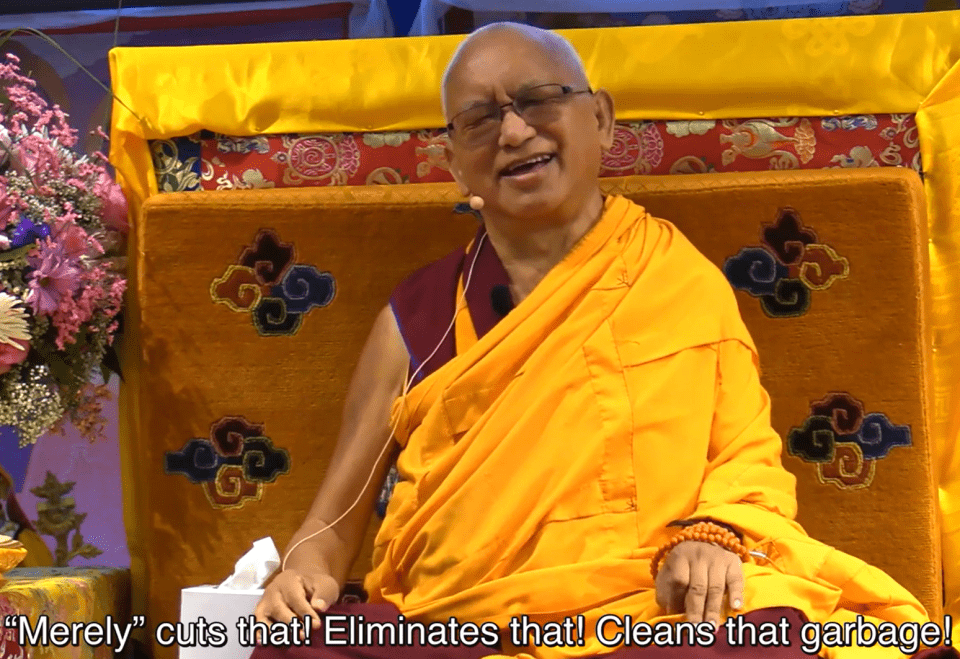
Lama Zopa Rinpoche teaching during Light of the Path retreat, hosted by Kadampa Center, Raleigh, North Carolina on 22th August 2017.
Following the commemoration activities at Kopan Monastery honoring the one-year anniversary of Lama Zopa Rinpoche showing the aspect of passing away, a Heart Sutra Retreat was held from April 15-20, 2024 with commentary by His Eminence the 104th Ganden Tripa, meditations led by Ven. Steve Carlier, and evening sessions with short extracted videos of Lama Zopa Rinpoche teaching a topic related to emptiness.
We are so pleased to share the ten videos of Rinpoche’s teachings on emptiness which were shown during the 2024 Heart Sutra Retreat. These videos, from 2017 and 2019, all contain subtitles, to make it easier to follow along while watching.
Please enjoy the first video in this series, “How the False I Comes Into Existence” and feel very free to view the others in this collection as you wish.
Watch “How the False I Comes Into Existence”:
https://www.youtube.com/watch?v=WJJz6UZ_9lg
We continue to add videos of teaching events with Lama Zopa Rinpoche, as well as other collections of teachings, that were previously unavailable to our Rinpoche Available Now page. Please take full advantage of this resource and explore the hundreds of hours of teachings Rinpoche left for our benefit.
A booklet with instructions by Lama Zopa Rinpoche for doing a retreat related to the Heart Sutra can be found here:
https://shop.fpmt.org/Heart-Sutra-Practices-and-Instructions-for-Retreat-PDF_p_1775.html
Additionally, please explore more Heart Sutra materials and resources below:
- The Heart of the Perfection of Wisdom Sutra – MP3 Download
- The Heart of the Perfection of Wisdom Sutra – eBook & PDF
- Watch the teaching in which Rinpoche gives the oral transmission of the Heart Sutra on video. (The oral transmission begins at 42:58.)
- FPMT Basic Program Online: Heart Sutra
- Essence Of The Heart Sutra by His Holiness the Dalai Lama, eBook & PDF
- Audio: Emptiness Explained – MP3 Download
Lama Zopa Rinpoche (1945-2023) was the spiritual director of the Foundation for the Preservation of Mahayana Tradition (FPMT), a Tibetan Buddhist organization dedicated to the transmission of the Mahayana Buddhist tradition and values worldwide through teaching, meditation and community service.
- Tagged: heart sutra, heart sutra retreat
23
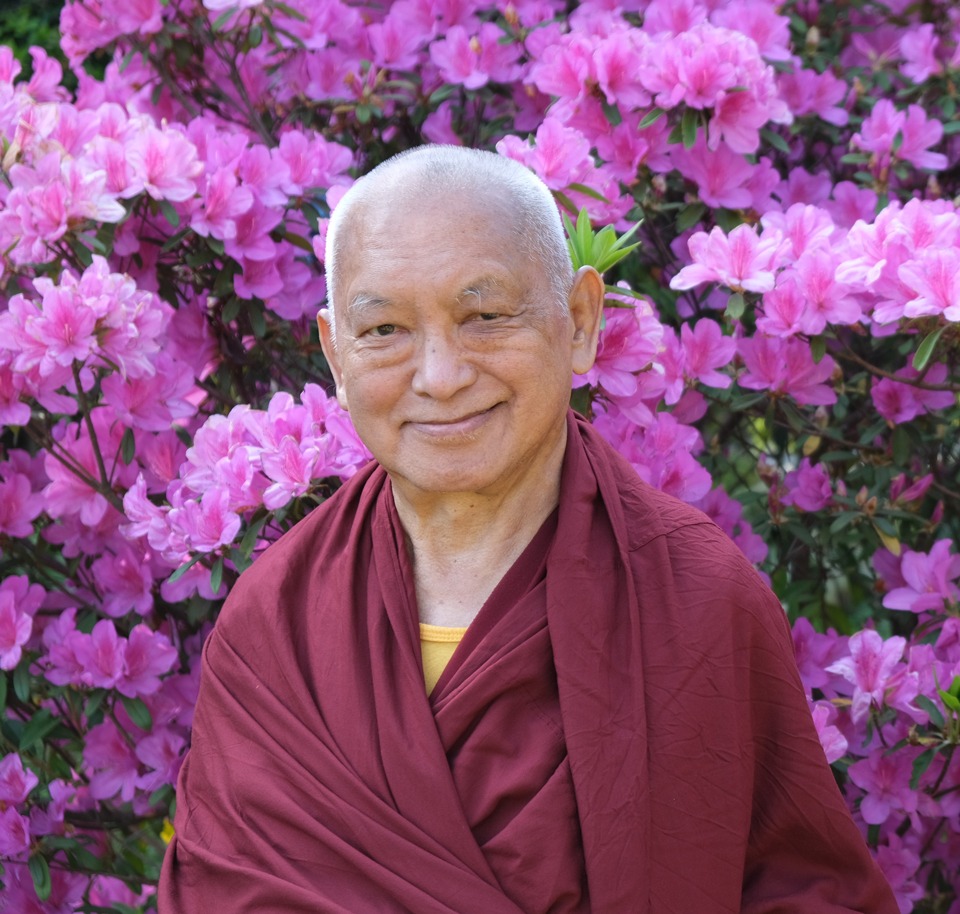
Lama Zopa Rinpoche at Kopan Monastery, Nepal, April 2020. Photo by Ven. Lobsang Sherab.
Today, May 23, 2024, is the day we observe the merit-making day of Saka Dawa which commemorates Shakyamuni Buddha’s birth, enlightenment, and parinirvana when karmic results are multiplied by 300 million times as it commemorates Shakyamuni Buddha’s three major life events. As Lama Zopa Rinpoche explained, “Because Saka Dawa combines these three special days, the possibility to create merit is unbelievable. Due to this, it is very important for one to use this opportunity to do everything the best!”
We wish to remind you of recent advice and news we have shared, to help enrich your personal practice on this special day:
- Recommended Practices for Saka Dawa
- Opportunity to Join in the Merit of 10,000 Sangha Praying for All Beings
- New Advice from His Holiness the Dalai Lama Concerning Lama Zopa Rinpoche’s Swift Return
Lama Zopa Rinpoche also advised that, “It is so important also to understand that if one collects non-virtue on merit multiplying days, then that will also increase by that many number of times. One has to be careful to not increase non-virtuous actions during the merit multiplying days.”
In 2020, Rinpoche offered “Advice for Saka Dawa” from Kopan Monastery. (Rinpoche’s teaching starts at 22:51 in this video). You can also read the transcript of this advice.
Watch Lama Zopa Rinpoche’s teaching “Advice for Saka Dawa”:
https://youtu.be/xYWCFIwZgTk
Foundation for the Preservation of Mahayana Tradition (FPMT), is a Tibetan Buddhist organization dedicated to the transmission of the Mahayana Buddhist tradition and values worldwide through teaching, meditation and community service.
7
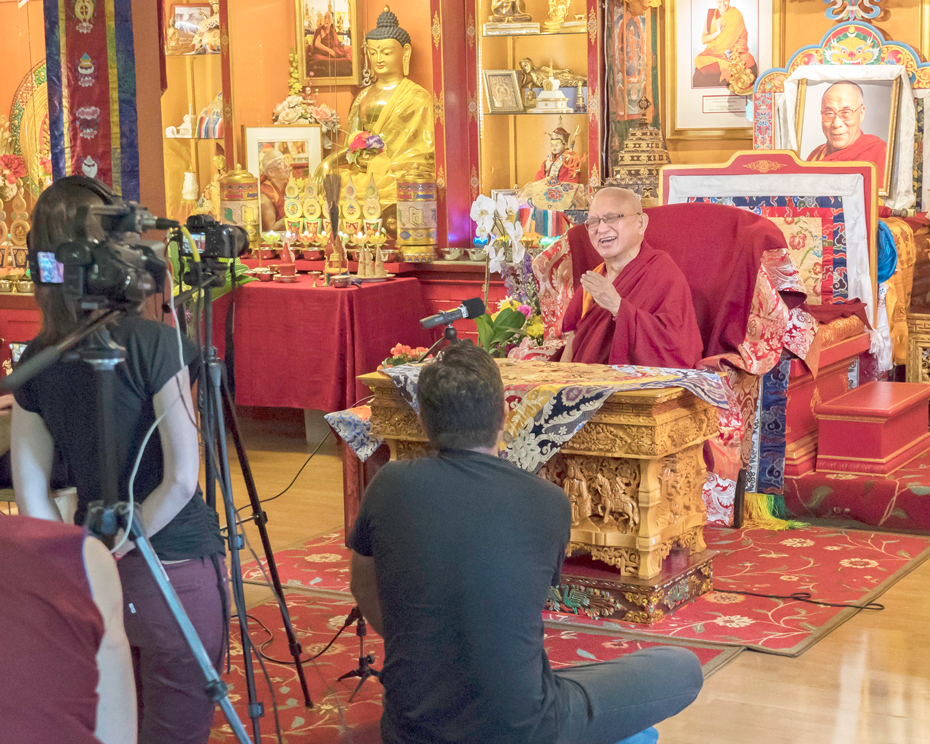
Lama Zopa Rinpoche being interviewed by Wisdom Publication’s Daniel Aitken, Kurukulla Center, Massachusetts, US, August 2018. Photo by Ven. Lobsang Sherab.
In 2018, Wisdom Publications director, Daniel Aitken, spoke with Lama Zopa Rinpoche for over an hour during one of Rinpoche’s visits to Kurukulla Center in Boston, US. This conversation was featured on the Wisdom Podcast later that year. During the interview, Rinpoche speaks on many topics, including stories about his early days as a young monk, how he became a Gelugpa, and how he ended up at Buxa in West Bengal, India, where he met Lama Yeshe. Rinpoche also offers a succinct teaching on emptiness and essential everyday Dharma practice advice.
We are so fortunate that so many precious videos, photos, teachings, and advice were captured of Lama Zopa Rinpoche and this interview is a true treasure.
We invite you to watch this joyful (and at times very funny!) conversation Rinpoche shared with Daniel for the benefit of all.
Please watch Daniel Aitken’s Interview with Lama Zopa Rinpoche:
https://www.youtube.com/watch?v=uQh1yZrj1CM
There are dozens of Wisdom Podcasts available to listen to with accomplished teachers, scholars, and practitioners of Buddhism.
Lama Zopa Rinpoche (1945-2023) was the spiritual director of the Foundation for the Preservation of Mahayana Tradition (FPMT), a Tibetan Buddhist organization dedicated to the transmission of the Mahayana Buddhist tradition and values worldwide through teaching, meditation and community service.
- Tagged: interview, wisdom podcast
30
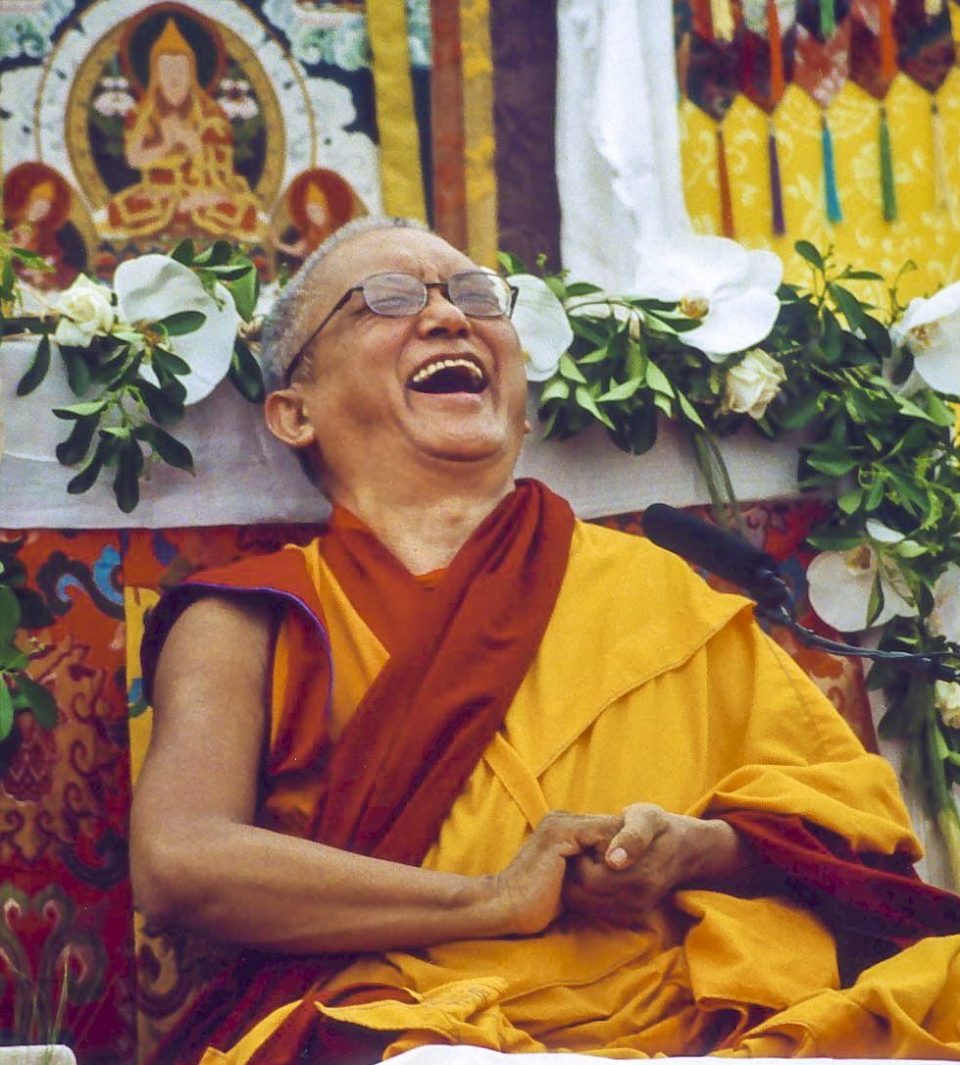
Lama Zopa Rinpoche teaching at the Four Kadampa Deities Retreat, Institut Vajra Yogini, France, 2003. Photo by Ven. Thubten Kunsang.
Recently we shared the addition to our Rinpoche Available Now page of Lama Zopa Rinpoche’s 2003 twenty-three part teachings from a Four Kadampa Deities Retreat offered at Institut Vajra Yogini, France. The retreat focused on the four Kadampa deities, however, Rinpoche taught on a broad range of lamrim topics.
Today we wanted to bring to your attention teaching #3 in this series, “Meditating on the Emptiness in Sound.”
In this teaching Rinpoche discusses a meditation practice focused on the sound of rain, suggesting two meditations: one on the conventional truth of the rain and the other on the emptiness of the rain.
Rinpoche advises to analyze how the sound of rain appears to one’s mind, questioning whether the sound is merely labeled by the mind or if it appears to exist independently from its own side. The correct view, according to the Prasangika school, is that the sound is merely imputed by the mind on the base of the sense of the ear.
Next, meditate on the sound’s hallucinatory nature and its emptiness, recognizing that the sound is not inherently existent and is merely imputed by the mind. The goal is to differentiate between the hallucinatory appearance of the sound and its ultimate nature, emptiness. Meditation on emptiness helps break the root of samsara, but it is crucial to start the practice with bodhicitta motivation to make one’s life most beneficial for sentient beings.
Rinpoche discusses the importance of mindfulness and awareness in daily life, using the lamrim as an antidote to delusions and a means to practice awareness. Sound can be used as an object of meditation to cultivate wisdom and bodhicitta, leading to liberation and enlightenment for oneself and all sentient beings.
We invite you to watch this full video and engage with a lightly edited version of this teaching which is available from the Lama Yeshe Wisdom Archive.
Watch “Meditating on the Emptiness in Sound”
https://www.youtube.com/watch?v=tnO2p255auw
As a reminder, this entire retreat is now available for students to explore as they wish.
Foundation for the Preservation of Mahayana Tradition (FPMT), is a Tibetan Buddhist organization dedicated to the transmission of the Mahayana Buddhist tradition and values worldwide through teaching, meditation and community service.
23
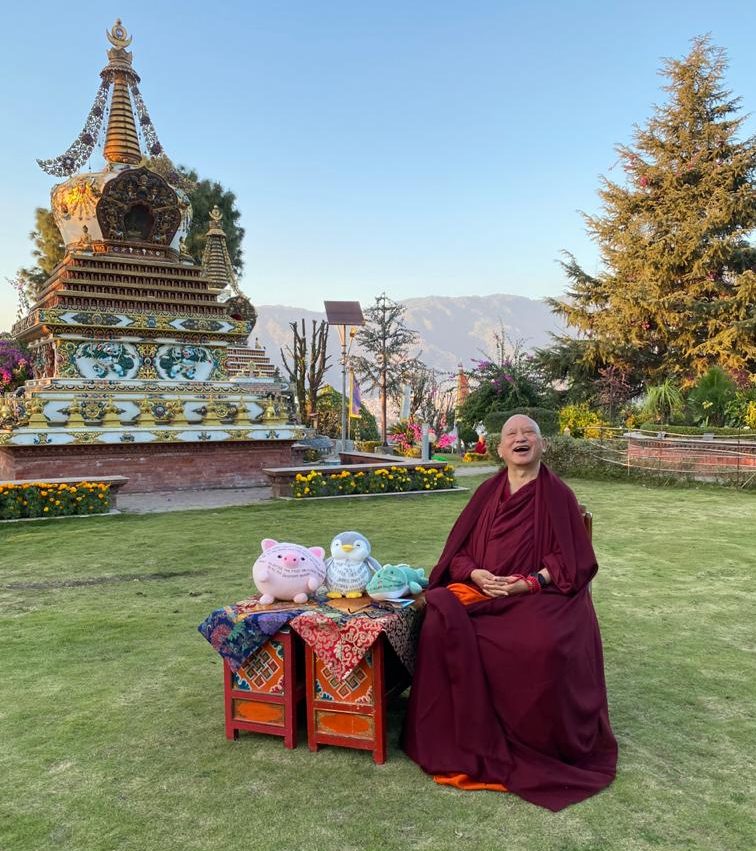
Lama Zopa Rinpoche in the garden at Kopan Monastery accompanied by some friends with Dharma messages, 2020. Photo by Ven. Roger Kunsang. .
Around the beginning of 2020, when all the world was experiencing lockdowns and turmoil due to the covid pandemic, students of Lama Zopa Rinpoche were relieved to receive Rinpoche’s laughter, wisdom, humor, and orientation toward Dharma in the form of a series of video teachings from his room in Kopan Monastery. These teachings came to be known as the thought transformation teaching series, and for many of us, they were truly a lifeline in an extremely uncertain time.
When the fourth video of this series was released, students noticed something interesting coming into view on Rinpoche’s couch and desk. A stuffed monkey, hippo, and elephant; as well as a wooden elephant and model yak had joined Rinpoche for his teaching. As time went on, more and more stuffed friends began appearing in Rinpoche’s room, soon with mantras, embellishments such as eyelashes and eye-liner, and profound (and often hilarious!) Dharma messages.
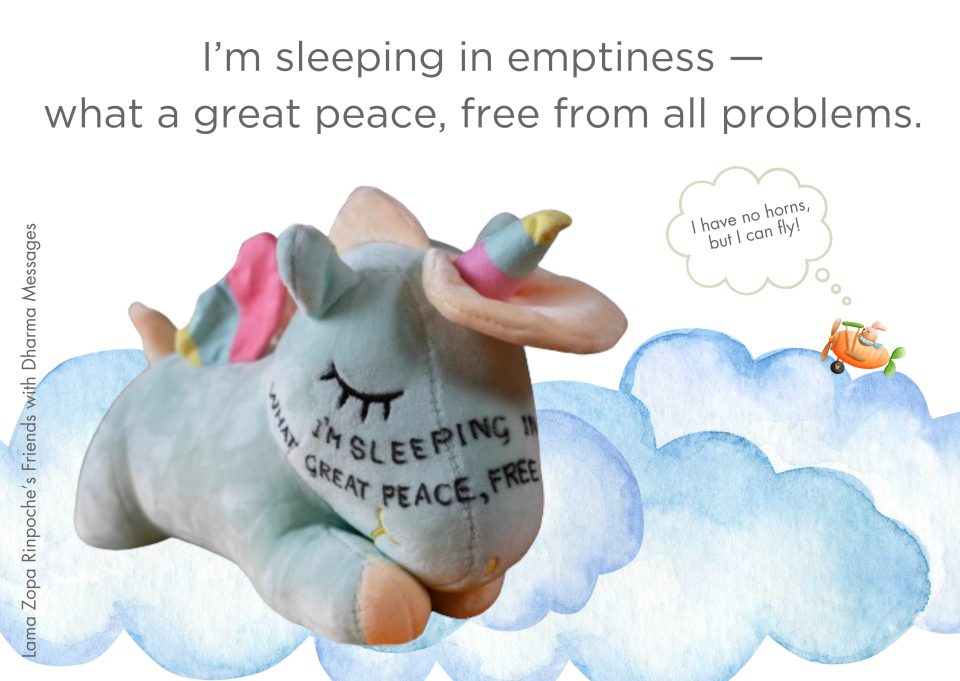
One of the postcards of Lama Zopa Rinpoche’s friends with Dharma messages.
Last year we created a gallery of these friends with Dharma messages, and now we are very happy to share with you a set of seven postcards featuring the animal toys with messages dictated by Rinpoche. These are PDFs suitable for the 148 x 105 mm postcard size printing, but can also be used digitally:
https://shop.fpmt.org/lama-zopa-rinpoches-friends-with-dharma-messages-pdf.html
You can read about the history of this whimsical enlightened activity and enjoy many photos from over the years.
Lama Zopa Rinpoche (1945-2023) was the spiritual director of the Foundation for the Preservation of Mahayana Tradition (FPMT), a Tibetan Buddhist organization dedicated to the transmission of the Mahayana Buddhist tradition and values worldwide through teaching, meditation and community service.
- Tagged: plushy toys
28
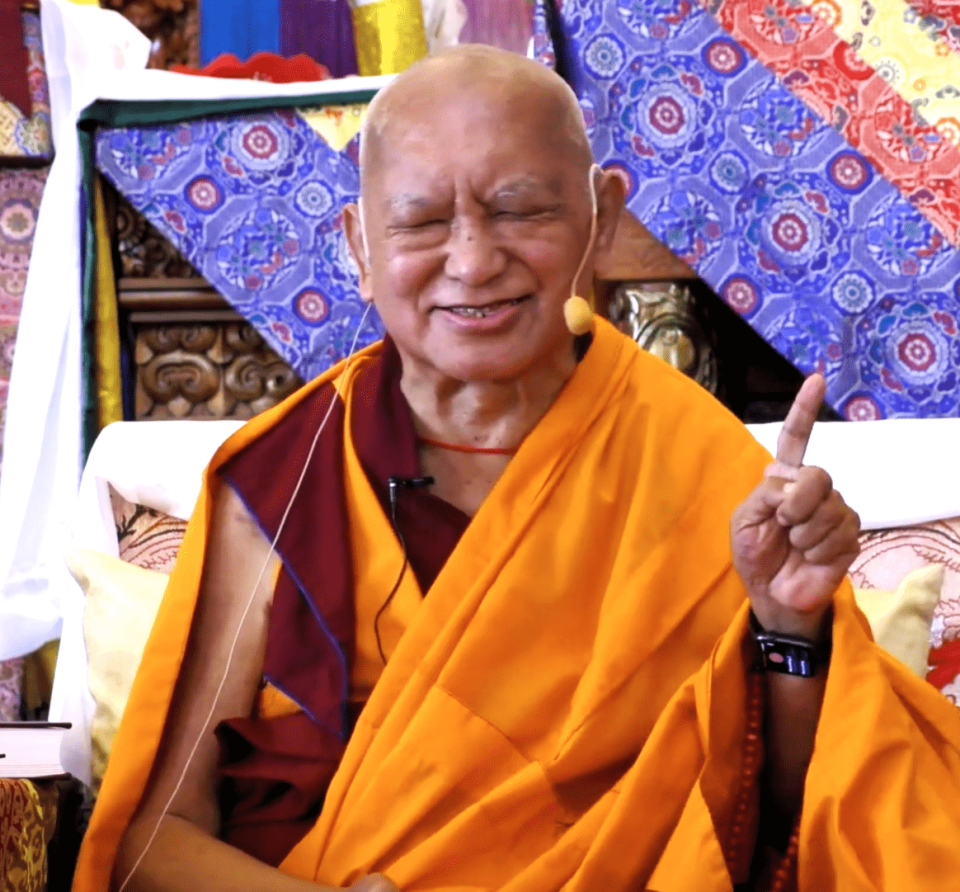
Lama Zopa Rinpoche teaching at Kopan Monastery, April 8, 2023.
Lama Zopa Rinpoche offered four teachings at Kopan Monastery on April 7, 8, and 9 before leaving for Tsum Valley on April 10. As we now all know, Rinpoche showed the aspect of passing away on April 13, and as such, these teachings are particularly precious as they are the last organized and recorded teachings Rinpoche offered in this life.
Today we are sharing advice that was offered by Rinpoche on April 9 during his longer teaching, and excerpted in two parts for inclusion in our 2023 Annual Review. This essential, clear advice is particularly meaningful to those offering service within the FPMT organization.
The One Answer is to Practice Lamrim
If you want to make your life really fruitful, really meaningful, the one answer is to practice lamrim. Otherwise, your life is spent in hallucination. There are many different levels of hallucination. Your life is spent in distraction, with attachment and anger, but especially with attachment. Like that, your life is spent in hallucination. …
Even if you’re working, even if you have to do a job to make money, your motivation should be to benefit sentient beings, to serve sentient beings. Do you understand?
You should be humble and respectful with your body, speech, and mind. You should be kind to everyone, even those who criticize or harm you. You should be kind, polite, and serve others with your body and speech.
It makes people so happy when you speak politely to them. With holy objects, you have a mind of devotion, but with sentient beings, you should have compassion.
The Quickest Way to Enlightenment
The guru is more precious than Buddha Vajradhara.
The guru is the creator, the doer, who manifests the numberless buddhas. This is mentioned in the tantric teachings. When you receive teachings in the future from someone with whom you have a guru-disciple relationship, this is the meditation that you should do. You are receiving the teaching or initiation from all the buddhas. You are also receiving it from your special deity. Do you understand?
You have to have that understanding. It is so precious, so precious, so precious. It is similar when you are making offerings or offering service. You are making offering or offering service to the one who is more special than all the buddhas, more special than even your own deity.
You have to keep all that in your mind; you have to keep it in your diarrhea book [Rinpoche often jokingly referred to a students’ Dharma journal for notes, quotations, and teachings as their “diarrhea book”]. I have just mentioned the essence of the practice of guru yoga. It is mentioned very clearly in the long Six-Session Yoga. Even if you are offering a meal, tea, water, or a candy, since the numberless atoms of the guru’s holy body are all the buddhas, it means you are offering to numberless buddhas.
Even in each atom there are numberless buddhas. Whatever it is—you’re offering service, receiving teachings or advice or a scolding—it is all the buddhas; it comes from all the buddhas, so, from your mind-seal deity.
So, that is the guru yoga practice, and that is the reality.
Through that, you then receive the blessings of the guru; then through that, you achieve enlightenment.
Okay, thank you. Thank you very much. I’m not advertising that I’m buddha. I’m not saying that.
Generally, this is how you should think in the future, okay. Yes, for you, your guru is more precious than the numberless buddhas, more precious than your own deity. That is so important.
Think this with everything: with every offering and offering of service, with receiving advice. It’s so important. You then collect the highest merit and experience the greatest purification. Do you understand?
This is the quick way to achieve enlightenment.
Transcribed and subsequently edited by Ven. Ailsa Cameron from the audio recording of Lama Zopa Rinpoche’s April 9, 2023 teaching at Kopan Monastery. Excerpted for inclusion in the 2023 Annual Review by FPMT International Office.
Lama Zopa Rinpoche (1945-2023) was the spiritual director of the Foundation for the Preservation of Mahayana Tradition (FPMT), a Tibetan Buddhist organization dedicated to the transmission of the Mahayana Buddhist tradition and values worldwide through teaching, meditation and community service.
27
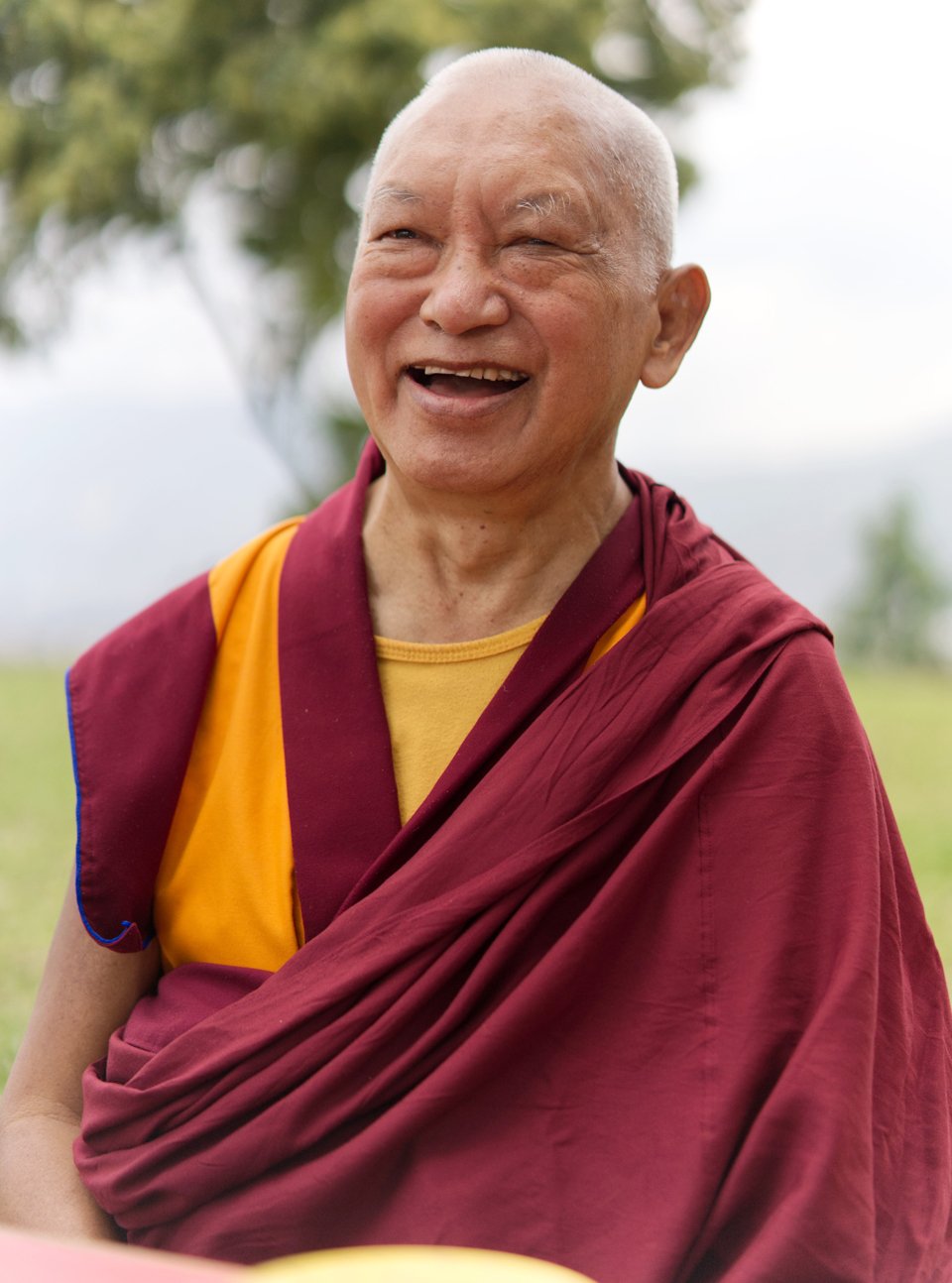
Lama Zopa Rinpoche on top of Kopan Hill, Kopan Monastery, Nepal, May 2020. Photo by Ven. Lobsang Sherab.
We recently shared news that Lama Zopa Rinpoche’s newest volume from Wisdom Publications, Perseverance: The Determination of the Bodhisattva is available.
Today we offer you a chapter from this book made available from Wisdom titled “Overcoming Laziness.” In this transformative chapter, Rinpoche offers invaluable insights and practical guidance on how to overcome laziness, which he explains is the greatest obstacle to happiness.
The Three Types of Laziness
Laziness, the antithesis of perseverance, is the devil that most interferes with transforming the mind and, therefore, it is the greatest obstacle to happiness. There are three types of laziness:
1. The laziness of procrastination
2. The laziness of being attached to worldly affairs
3. The laziness of discouragement
Of this Shantideva says,
7.2b And what are the adversaries of fortitude?
They are indolence, a fondness for evil, and despondency and self-deprecation.
The first laziness, the laziness of procrastination or indolence, blocks our energy for Dharma practice and causes us to waste time with distractions. This kind of laziness comes about as a result of lacking the understanding of the nature of samsara, the cause of suffering, and the evolution of karma. The second type, being attached to worldly affairs, is the worst form of laziness, the laziness that draws us to engage in negative actions of greed, ignorance, and hatred—actions that are the opposite of Dharma practice. The third type of laziness, discouragement or despondency, causes us to not do positive things with the excuse that we are unable to do them. This is the mind that thinks, “It’s beyond my capabilities.” The less lazy we are, the fewer hindrances to meditation we will experience.
Spending all day and all night working for samsaric comforts is considered laziness from the Dharma point of view. Because we don’t remember our past sufferings or know those that lie ahead, we work hard for ignorance and greed; we are lazy in that way.
Milarepa said that by having generated impermanence, he was able to conquer “the devil, laziness,” and then whatever action he did became the Dharma. Highly realized beings, such as Lama Tsongkhapa, are utterly without laziness. Without talking about all the other unimaginable great actions they do, because of their bodhichitta, even just breathing becomes great work for other sentient beings.
Continue reading Lama Zopa Rinpoche’s full chapter on “Overcoming Laziness.”
Learn more about Perseverance: The Determination of the Bodhisattva from Wisdom Publications and order your copy today:
wisdomexperience.org/product/perseverance
Lama Zopa Rinpoche (1945-2023) was the spiritual director of the Foundation for the Preservation of Mahayana Tradition (FPMT), a Tibetan Buddhist organization dedicated to the transmission of the Mahayana Buddhist tradition and values worldwide through teaching, meditation and community service.
18

Lama Zopa Rinpoche teaching at the 4 Kadampa Deities Retreat, Institut Vajra Yogini, France, 2003. Photo by Ven. Kunsang Thubten.
Recently we shared the addition to our Rinpoche Available Now page of Lama Zopa Rinpoche’s 2003 twenty-three part teachings from a Four Kadampa Deities Retreat offered at Institut Vajra Yogini, France. The retreat focused on the four Kadampa deities, however, Rinpoche taught on a broad range of lamrim topics.
Today we wanted to bring to your attention teaching #5 in this series, “Enlightenment through Compassion.”
In this teaching, Rinpoche began by discussing the importance of helping young people and expresses a sense of urgency for Universal Education as a method that can bring peace to individuals and the world, regardless of their religious background. By fostering compassion, wisdom, and good conduct, individuals can bring peace not only to themselves and their families but also to their countries, the world, and all sentient beings.
Rinpoche discussed the power of generating compassion toward even a single sentient being by sharing the story of Getsul Tsembulwa, a disciple of the great yogi Nakpo Chopawa, encountering a woman with leprosy who needed help crossing a river. This story shows how compassion toward even one sentient being can lead to enlightenment. The stronger the compassion, the quicker the path to enlightenment becomes. By giving up one’s life and sacrificing for the welfare of another, heavy negative karma is purified, allowing one to see the true nature of the deity. Generating compassion toward even one sentient being can make that being the most kind and precious person in one’s life. Generating compassion leads to bodhichitta, which is the root of the Mahayana path of enlightenment. Once enlightened, one can liberate countless sentient beings from samsaric suffering and bring them to enlightenment, thus continuously benefiting others.
Rinpoche stressed that it is important to practice holy Dharma throughout life, as death is certain and only holy Dharma can guide one at that crucial moment. Rinpoche advises keeping the mind in the lamrim, the stages of the path to enlightenment, and engaging in virtuous actions aligned with the teachings. By doing so, every aspect of life becomes meaningful and contributes to one’s progress toward liberation and enlightenment.
At the end of Rinpoche’s talk, he delves into meditation on emptiness.
We invite you to watch this full video and engage with a lightly edited version of this teaching which is available from the Lama Yeshe Wisdom Archive.
As a reminder, this entire retreat is now available for students to explore as they wish.
Foundation for the Preservation of Mahayana Tradition (FPMT), is a Tibetan Buddhist organization dedicated to the transmission of the Mahayana Buddhist tradition and values worldwide through teaching, meditation and community service.
1
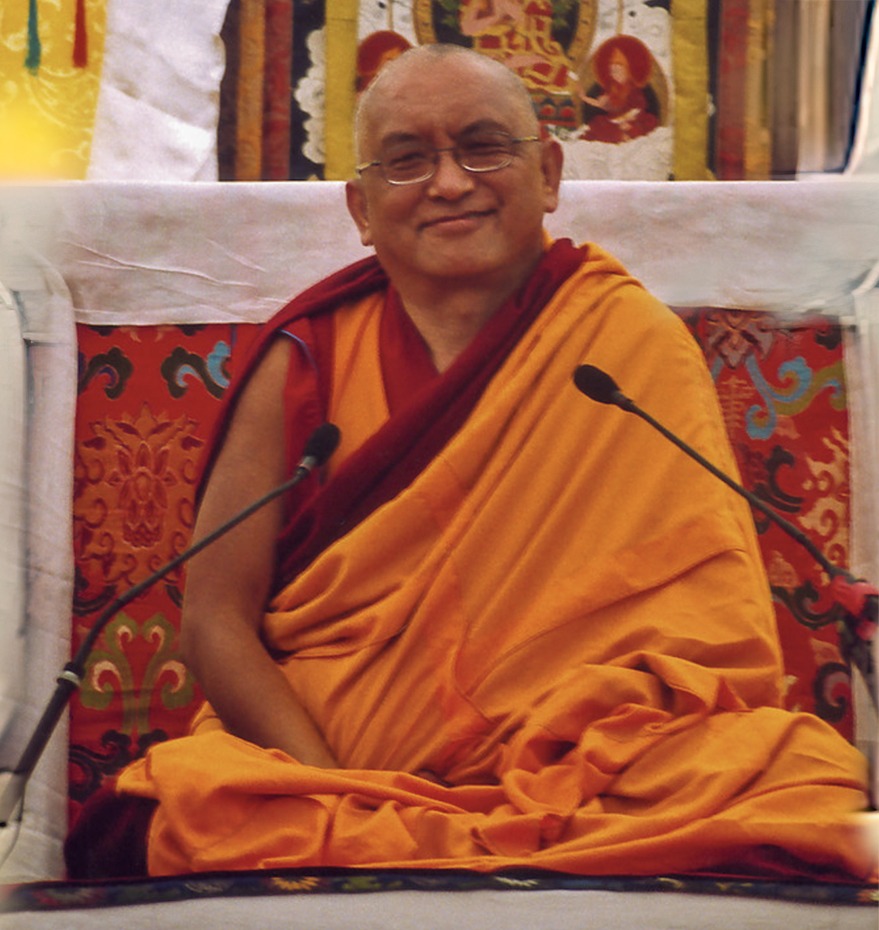
Lama Zopa Rinpoche teaching during the Four Kadampa Deities Reteat, Institut Vajra Yogini, France, 2003.
From April 18 to May 11, 2003 Lama Zopa Rinpoche gave extensive teachings (twenty-three videos!) during the Four Kadampa Deities Retreat at Institut Vajra Yogini, France. The retreat focused on the four Kadampa deities, however, Rinpoche teaches on a broad range of lamrim topics. Each of the videos on YouTube includes summaries of the main topics discussed by Rinpoche.
We are so pleased to announce today that this entire retreat is now available on our Rinpoche Available Now page!
As we work to process all of the legacy videos of Rinpoche’s teachings, we rejoice that this is the first major retreat finished! We have many more videos coming up and we hope students will take full advantage of connecting with Rinpoche’s previously unavailable videos in this way.
The Lama Yeshe Wisdom Archive previously published the contents of this retreat as well, and you are welcome to read the lightly edited teachings there. You can also find a full transcript of this event for download.
Lama Zopa Rinpoche (1945-2023) was the spiritual director of the Foundation for the Preservation of Mahayana Tradition (FPMT), a Tibetan Buddhist organization dedicated to the transmission of the Mahayana Buddhist tradition and values worldwide through teaching, meditation and community service.
7
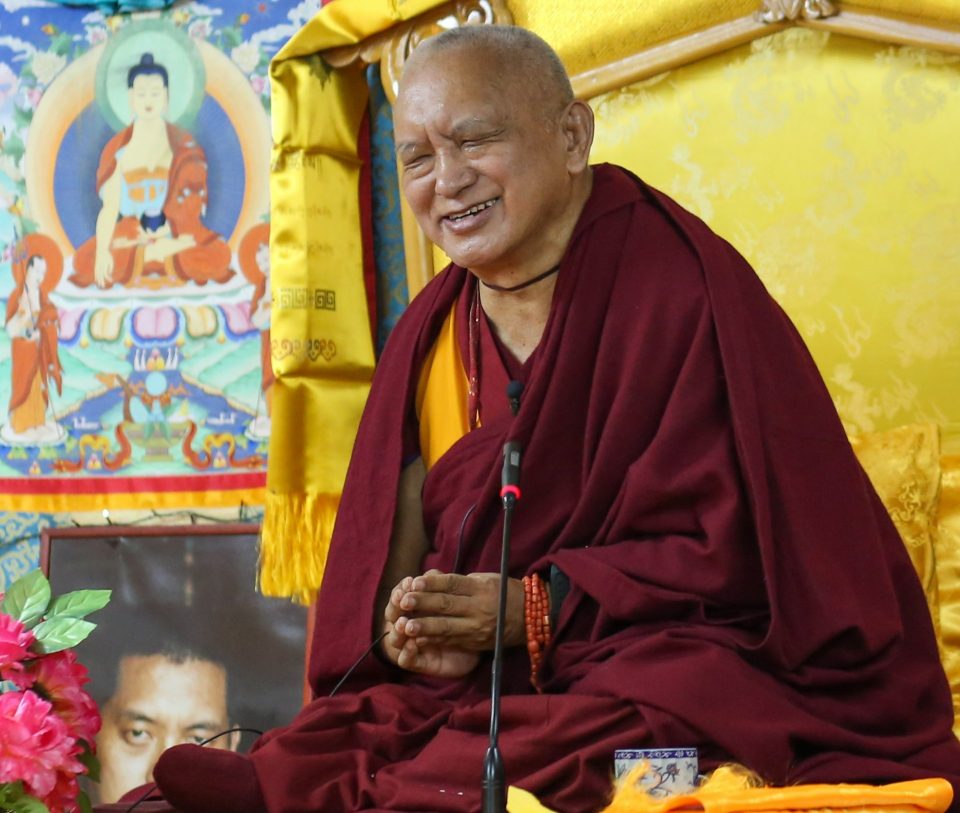
Lama Zopa Rinpoche offering advice to the students in Mongolia, September 2013. Photo by Ven. Thubten Kunsang
Lama Zopa Rinpoche received thousands of letters every year from people seeking guidance on a variety of issues. In 2013 Rinpoche dictated a letter about the three types of suffering to a student’s mother who was worried about death.
“In reality, even if we believe that we will live for a long time, that we have so many years to live – like 100 years or more, and maybe after 100 years, we expect another hundred years (I’m joking) – in reality, there is nobody who has lived who has not died,” Rinpoche wrote.
“Even this big earth has to perish after another great eon. Since every person who is born in this world is under the control of karma and delusion, there is nobody, nobody, since human beings started until now, who has lived without death. There is nobody.
“Buddha has no death, because there is no cause of death. The cause of death is not outside but inside –karma and delusions. Buddha removed this inconceivable eons ago, because he purified the delusions and even the subtle obscurations which interrupt the omniscient mind, so it is impossible for the Buddha to experience death. There is no old age, no sickness, no death for him at all, but he showed holy deeds, passing away in the sorrowless state. If Buddha did not show death, then we would not appreciate his teachings and we would become very lazy. Buddha showed death to destroy the wrong concept of permanence of our lives, which are impermanent, and also to show us that we need to practice Dharma, because of suffering and the cause of suffering. …”
You can read the entire letter “The Cause of Death” on the Lama Yeshe Wisdom Archive website.
FPMT.org makes available many practices and resources available for the death and dying of ourselves and our loved ones (and pets!). All are welcome to explore all that is available, collected and compiled over time according to the advice of Lama Zopa Rinpoche:
fpmt.org/death
Please explore more recent teachings from Lama Zopa Rinpoche on death and impermanence:
fpmt.org/tag/death-and-dying
Lama Zopa Rinpoche (1945-2023) was the spiritual director of the Foundation for the Preservation of Mahayana Tradition (FPMT), a Tibetan Buddhist organization dedicated to the transmission of the Mahayana Buddhist tradition and values worldwide through teaching, meditation and community service.
30
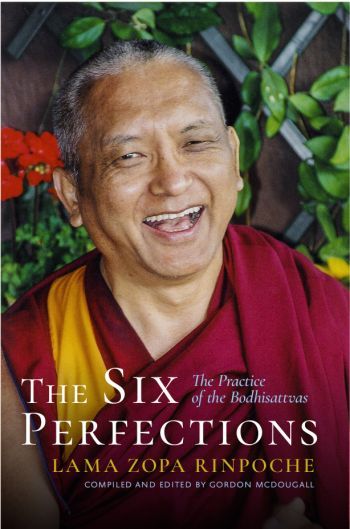
In The Six Perfections: The Practice of the Bodhisattvas (2020), Lama Zopa Rinpoche walks us through the six perfections, which are a key Mahayana Buddhist teaching.
Today we share an excerpt from Rinpoche’s teaching on the perfection of charity from this book, available from Wisdom Publications:
Keeping our mind pure—free from pride, miserliness, and so forth—is very difficult for ordinary people like us. If we could give simply, without all these disturbing thoughts clouding our giving, our generosity would be perfect and attaining another perfect human rebirth would be easy. But this is a struggle for most of us. That is why we must always check our motivation and be diligent in observing our karma.
The villagers of Solu Khumbu, where I was born, have a very good custom to protect themselves and others. Because they are incredibly poor, theft is always a problem. Things are often stolen: cooking pots, money—even potatoes. In many villages the people bury pots of their precious potatoes outside to keep them safe, but thieves can generally guess where the pots are buried, and they dig them up. Also, sometimes people borrow things and don’t return them, no matter how much the owner complains and shouts.
In such cases of theft, the villagers often go to a monastery and ask the lama there to say prayers and dedicate the merit of the prayer to the thief, totally offering them that thing. Whether or not this becomes a virtuous act does not depend on the lama but on the mind of the victim. If the person can renounce the stolen object completely and offer it to the thief with compassion, then it is virtuous. The owner needs the object, but the thief also needs it, and so by renouncing it and offering it to the thief with compassion, the dedication becomes a virtuous action.
If somebody stole a hundred dollars from us and we cannot do the practice of dedication—if we cannot take the loss upon ourselves and offer the victory to that sentient being; if we still cling to that hundred dollars—how can we perfect the practice of charity? Even without considering how kind that sentient being has been, how precious they are, we should rejoice that they needed something and now they have it. Like us, they want happiness and do not want suffering—in that way they are completely equal to us—so why can’t they have that hundred dollars? If we were to find a hundred dollars, how happy we would be. If we were to find a thousand dollars or a million dollars, we would be so surprised and excited. We would clap our hands with joy. So why can’t we do the same thing for this sentient being who has come across a hundred dollars?
Excerpted from Chapter 1, The Six Perfections: The Practice of the Bodhisattvas, Wisdom Publications, 2020.
Explore more teachings on the six perfections from Lama Zopa Rinpoche including other excerpts from this book.
Learn more about The Six Perfections: The Practice of the Bodhisattvas, including order information, on Wisdom Publication’s website:
https://wisdomexperience.org/product/the-six-perfections/
The Six Perfections is also available as an e-book from the Foundation Store.
Lama Zopa Rinpoche (1945-2023) was the spiritual director of the Foundation for the Preservation of Mahayana Tradition (FPMT), a Tibetan Buddhist organization dedicated to the transmission of the Mahayana Buddhist tradition and values worldwide through teaching, meditation and community service.
- Tagged: six perfections
26
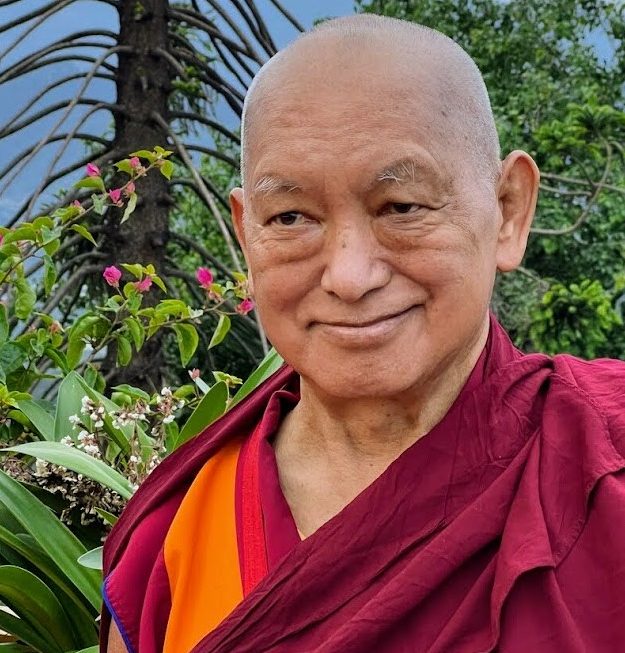
Lama Zopa Rinpoche in the garden at Kopan Monastery, Nepal, 2022. Photo by Ven. Roger Kunsang.
In a 2022 letter to an FPMT center director, Lama Zopa Rinpoche, the perfect epitome of patience, offered an unmissable teaching on why patience is critically important, and how to protect and cultivate it through applying conscientious effort. Explaining the value of patience, Rinpoche said it protects our hard-won merits, which are necessary for our liberation from samsara but which are easily destroyed through our acts of anger and heresy.
Rinpoche then advised on how best to dedicate our merits so as to protect them. Rinpoche’s letter also offers guidance on six ways to train the mind in patience: by seeing the “enemy” as the guru and as positive support, by realizing that the “enemy” has no freedom to act differently, by developing compassion, and by remembering karma and the emptiness of phenomena.
We offered a short edited version of this advice in our 2022 Annual Review, and now we are very happy to share this entire advice available as a PDF download.
Please explore other teachings from Lama Zopa Rinpoche on the topic of patience.
You can read other advice that Lama Zopa Rinpoche has offered students on the topic of patience and anger.
Order Lama Zopa Rinpoche’s book, Patience: A Guide to Shantideva’s Sixth Chapter from Wisdom Publications.
Lama Zopa Rinpoche (1945–2023) was the spiritual director of the Foundation for the Preservation of Mahayana Tradition (FPMT), a Tibetan Buddhist organization dedicated to the transmission of the Mahayana Buddhist tradition and values worldwide through teaching, meditation and community service.
- Home
- News/Media
- Study & Practice
- About FPMT Education Services
- Latest News
- Programs
- New to Buddhism?
- Buddhist Mind Science: Activating Your Potential
- Heart Advice for Death and Dying
- Discovering Buddhism
- Living in the Path
- Exploring Buddhism
- FPMT Basic Program
- FPMT Masters Program
- FPMT In-Depth Meditation Training
- Maitripa College
- Lotsawa Rinchen Zangpo Translator Program
- Universal Education for Compassion & Wisdom
- Online Learning Center
- Prayers & Practice Materials
- Overview of Prayers & Practices
- Full Catalogue of Prayers & Practice Materials
- Explore Popular Topics
- Benefiting Animals
- Chenrezig Resources
- Death & Dying Resources
- Lama Chopa (Guru Puja)
- Lama Zopa Rinpoche: Compendium of Precious Instructions
- Lama Zopa Rinpoche: Life Practice Advice
- Lama Zopa Rinpoche Practice Series
- Lamrim Resources
- Mantras
- Prayer Book Updates
- Purification Practices
- Sutras
- Thought Transformation (Lojong)
- Audio Materials
- Dharma Dates – Tibetan Calendar
- Translation Services
- Publishing Services
- Teachings and Advice
- Find Teachings and Advice
- Lama Zopa Rinpoche Advice Page
- Lama Zopa Rinpoche: Compendium of Precious Instructions
- Lama Zopa Rinpoche Video Teachings
- ༧སྐྱབས་རྗེ་བཟོད་པ་རིན་པོ་ཆེ་མཆོག་ནས་སྩལ་བའི་བཀའ་སློབ་བརྙན་འཕྲིན།
- Podcasts
- Lama Yeshe Wisdom Archive
- Buddhism FAQ
- Dharma for Young People
- Resources on Holy Objects
- Ways to Offer Support
- Centers
- Affiliates Area
- Teachers
- Projects
- Charitable Projects
- Make a Donation
- Applying for Grants
- News about Projects
- Other Projects within FPMT
- Support International Office
- Projects Photo Galleries
- Give Where Most Needed
- FPMT
- Shop
Translate*
*powered by Google TranslateTranslation of pages on fpmt.org is performed by Google Translate, a third party service which FPMT has no control over. The service provides automated computer translations that are only an approximation of the websites' original content. The translations should not be considered exact and only used as a rough guide.Buddhism is not at all a tactful religion, always trying to avoid giving offense. Buddhism addresses precisely what you are and what your mind is doing in the here and now. That’s what makes it so interesting.







